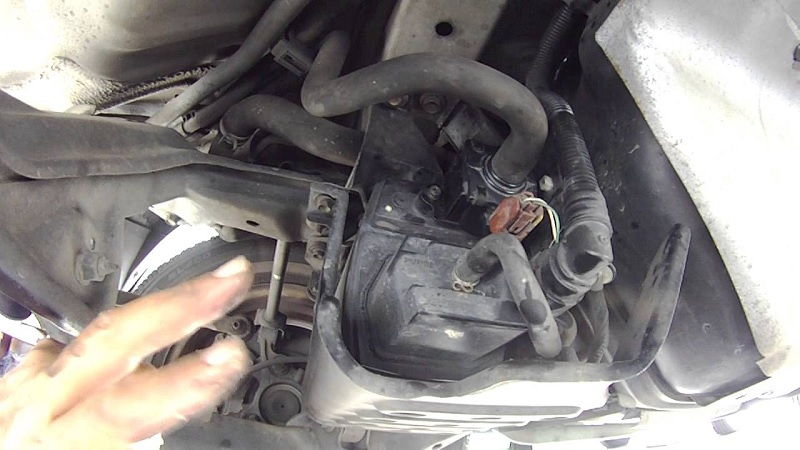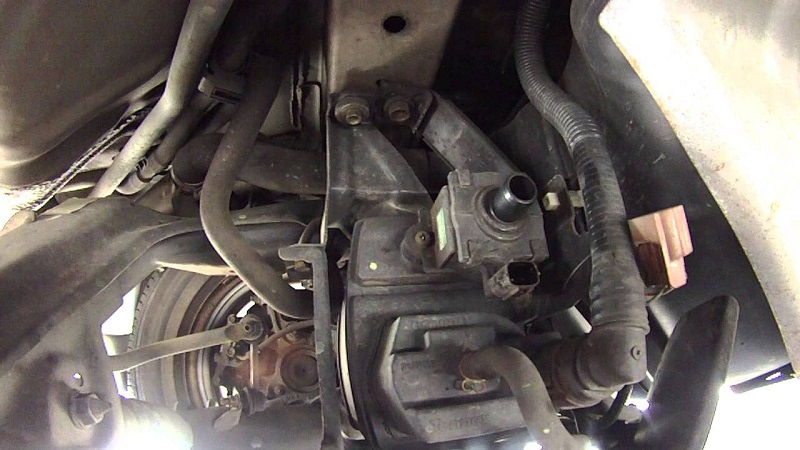This post contains affiliate links. This means I will make a commission at no extra cost to you should you click through and make a purchase [ “As an Amazon Associate, I earn from qualifying purchases.” ]. Read the full disclosure here.
P1457 Honda Crv GuideMechanic.Com – Importance Of Understanding The Code And Its Potential Impact On The Vehicles Performance And Emissions. Understanding the code that governs a vehicle’s performance and emissions is of great importance.
This code is responsible for controlling key aspects of a vehicle’s behavior, including its fuel injection, ignition timing, and exhaust emissions.
By understanding this code, vehicle owners and operators can better optimize their vehicles for maximum performance and efficiency, while minimizing harmful emissions that can be damaging to the environment.
Additionally, being familiar with the code can help ensure that any modifications or upgrades made to a vehicle are done in a safe and effective manner, without any negative impact on its overall performance or emissions.
See Also: P0730 Honda: Symptoms, Causes, Diagnosis
Therefore, it is crucial for anyone involved in the automotive industry to have a strong understanding of this code and its potential impact on vehicles.
What Is P1457 Honda CRV

P1457 is an OBD-II diagnostic trouble code related to the evaporative emissions system in Honda CRVs. This code indicates that there is a leak somewhere in the fuel tank system or the evaporative emissions control system, which could be caused by a faulty or loose gas cap, a damaged charcoal canister, or a leak in the fuel tank or fuel system.
The P1457 code typically triggers the check engine light to turn on, and it is important to address the issue promptly in order to avoid potential damage to the engine and to ensure that the vehicle stays compliant with emissions regulations.
A mechanic or qualified technician can diagnose the problem using specialized tools and equipment to pinpoint the source of the issue and make any necessary repairs or replacements to the affected components.
Definition Of P1457 Code
The P1457 code is a diagnostic trouble code (DTC) that is stored by the OBD-II system in a Honda Civic. This code is triggered when the OBD-II system detects that there is a malfunction in the evap control system.
The evap control system is responsible for storing and releasing fuel vapors from the fuel tank back into the engine when needed. When there is a malfunction in this system, it can cause the check engine light to come on and result in reduced fuel economy.
The P1457 code specifically indicates that there is a leak in the evap system that is causing fuel vapors to escape into the atmosphere. This can be caused by a broken or damaged evap canister, a faulty purge control valve, or a damaged fuel filler cap.
If you receive the P1457 code, it is recommended that you take your vehicle to a certified mechanic to have it diagnosed and repaired as soon as possible to prevent further damage to the car and to ensure that it is operating efficiently.
Common Causes For P1457 Code In Honda CRV
Check out this ANCEL AD310 Classic Enhanced Universal OBD II Scanner Car Engine Fault Code Reader CAN Diagnostic Scan Tool-Black

Code P1457 in Honda CRV is related to the evaporative emissions control system. The error code indicates that there is a leak in the system, which can cause the fuel vapors to escape into the atmosphere, leading to increased emissions.
Some common causes for this error code include a faulty gas cap, a leak in the fuel tank, a malfunctioning vent valve or purge valve, or a damaged hose in the system. In some cases, the issue may be caused by a failure of the canister or the charcoal media.
If you are experiencing a P1457 error code in your Honda CRV, it is recommended that you have the system inspected by a qualified technician to determine the underlying cause and prevent any further damage.
Symptoms Of P1457 Code
P1457 is an OBD-II trouble code that relates to the Evaporative Emissions Control System. This code indicates a leak in the system, which results in the fuel tank not being able to properly pressurize.
Symptoms of P1457 may include the check engine light illuminating on the dashboard, difficulty starting the engine, reduced fuel economy, and an overall decrease in engine performance. If left unaddressed, this issue can lead to higher levels of harmful emissions being released into the atmosphere.
It is important to have any P1457 diagnostic trouble codes thoroughly diagnosed and repaired in order to ensure proper vehicle operation and to help reduce your overall carbon footprint.
How To Troubleshoot P1457 Honda CRV

Here is a paragraph on how to troubleshoot P1457 error code on a Honda CRV: P1457 is an error code that indicates a problem with the EVAP system in a Honda CRV. To troubleshoot this issue, start by inspecting the gas cap to ensure it is correctly tightened and free from damage.
If the gas cap is in good condition, check the vacuum lines and charcoal canister for any signs of damage or leaks. You can also perform a smoke test to help identify the source of any leaks in the system.
See Also: Alternator 2006 Honda Pilot Replacement Cost
If you are unable to identify and fix the issue yourself, it is recommended to take your Honda CRV to a certified mechanic for a proper diagnosis and repair. Resolving the cause of the P1457 error code will ensure that your vehicle is running efficiently and compliant with emissions stKamurds.
Diagnosis Process For P1457 Code
P1457 is a diagnostic trouble code (DTC) that is often associated with the evaporative emissions system in a vehicle. The evaporative emissions system is responsible for storing and releasing fuel vapors that may otherwise escape into the atmosphere.
When the system detects a leak or malfunction, it will trigger the P1457 code.The diagnosis process for the P1457 code typically involves a visual inspection of the evaporative emissions system, followed by a diagnostic scan of the vehicle’s onboard computer.
During the visual inspection, the technician will look for obvious signs of damage or wear, such as cracked or broken hoses or loose connections. They will also check the fuel tank and fuel filler neck for signs of damage or corrosion.
The diagnostic scan of the onboard computer will provide more detailed information about the specific nature of the problem. This scan will typically involve the use of a diagnostic tool that connects to the vehicle’s computer system.
The diagnostic tool will record any error codes and provide a detailed report of the system’s performance.Once the problem has been identified, the technician will determine the best course of action to repair or replace the damaged or malfunctioning components.
This may involve replacing hoses, valves, or other components of the evaporative emissions system.In conclusion, the diagnosis process for the P1457 code involves a combination of visual inspection and diagnostic scanning.
Identifying and repairing the underlying issue may involve replacing components of the evaporative emissions system, and should be done by a qualified technician.
Common Troubleshooting Steps For P1457 Honda CRV Code

When the P1457 code is triggered in a Honda CRV, it means that there is a problem with the EVAP system. Specifically, it means that there is a leak in the EVAP system that is causing fuel vapors to escape into the atmosphere.
Fortunately, there are several common troubleshooting steps that you can take to diagnose and fix the problem.One of the first things to check is the gas cap. A loose or damaged gas cap can cause the P1457 code to be triggered.
Check to make sure that the gas cap is tight and in good condition. If it is loose or damaged, replace it with a new one.If the gas cap is not the problem, the next step is to check the EVAP canister and vent valve.
These components can become clogged or damaged over time, which can cause the P1457 code to be triggered. Check to make sure that the canister and valve are clean and in good condition. If they are dirty or damaged, replace them with new ones.
Another common cause of the P1457 code is a leak in one of the EVAP system hoses. Check all of the hoses for signs of damage or wear. If any of the hoses are damaged, replace them.If none of these steps fix the problem, it may be necessary to take the vehicle to a mechanic for further troubleshooting.
They may use a smoke machine to locate the source of the leak or perform other diagnostic tests to determine the cause of the problem.
Overall, it’s important to address the P1457 code as soon as possible to prevent further damage to the vehicle and reduce emissions into the environment.
Importance Of Addressing P1457 Honda CRV Code Promptly
P1457 is a common engine code that Honda CRV owners may encounter. This code indicates an issue with the evaporative emissions system, which can lead to problems with fuel efficiency and increased emissions.
It is important to address this issue promptly in order to prevent any further damage to your vehicle.Ignoring the P1457 code can result in decreased fuel efficiency, which can ultimately lead to higher fuel expenses.
Additionally, an unresolved emissions issue can be harmful to the environment. It is important to have the issue diagnosed by a qualified mechanic to determine the root cause of the problem and to correct it as soon as possible.
See Also: 2006 Honda Pilot Catalytic Converter
In conclusion, addressing the P1457 code in your Honda CRV promptly is essential to maintaining the health and longevity of your vehicle, while also doing your part to protect the environment.
- P008F Engine Coolant Temperature/Fuel Temperature Correlation - October 4, 2024
- P0090 Fuel Pressure Regulator 1 Control Circuit - October 2, 2024
- P0091 Fuel Pressure Regulator 1 Control Circuit Low - September 28, 2024
